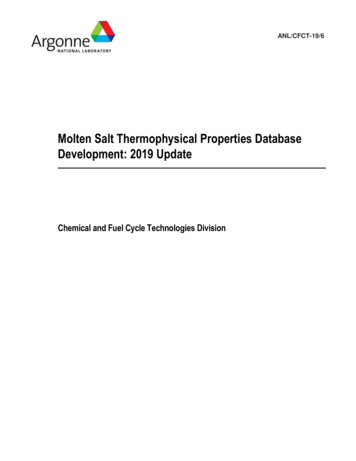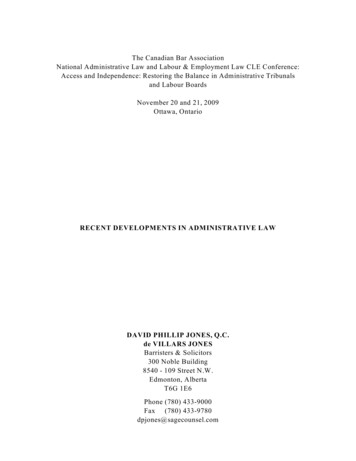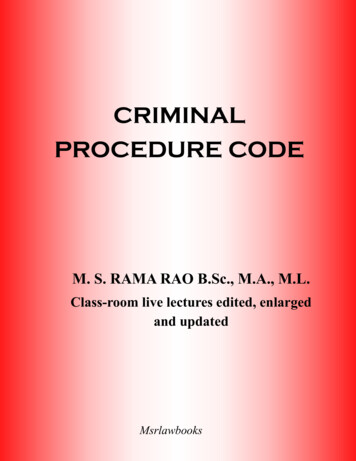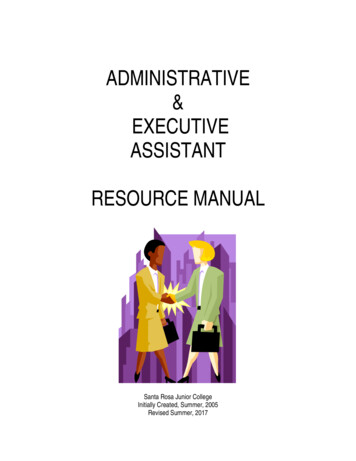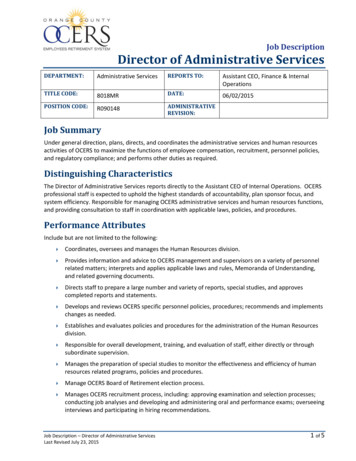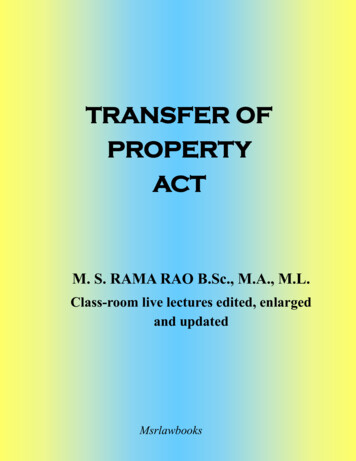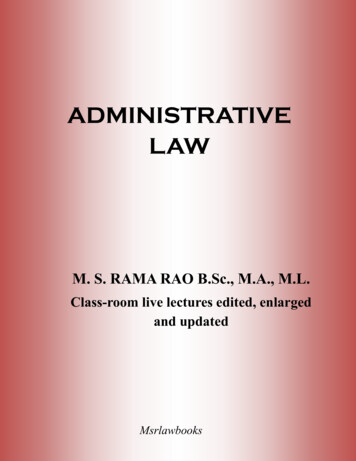
Transcription
ADMINISTRATIVELAWM. S. RAMA RAO B.Sc., M.A., M.L.Class-room live lectures edited, enlargedand updatedMsrlawbooks
Page1ADMINISTRATIVE LAWmsrlawbooksAdmistrative Law
SYLLABUS1.Administrative Law-Definition, Scope, Historicaldevelopment.French Droit Administratiff & Conseil d' etat.2.Rule of Law.3.(1) Franks Committee Report.(2)Donoughmore Committee Report.(3)Henry VIII Clause.(4) New Despotism.4.Separation of Powers.5.Judicial Quasi Judicial & Administrative functions6.(1) 'Delegatus non potest Delegare' - Non delegablefunctionsshould not be delegated.(2)Delegable functions.(3)Subordinate Legislation-meaning & scope.(4)Doctrine of Ultra Vires.- Substantive & procedural(5)Conditional Legislation.7.Purely Administrative functions or discretion - Scope-8.Principles of Natural Justice.(1)Nemo debet esse judex in propria causa.(2)'Audi alterem Partem'.9.Ombudsman- Lokpal & Lokyukta.10.Administrative Tribunals- Composition powers functions.Page211.Public Corporations- General features- Powers,functionsLegislative & Judicial Controls over publicCorporations.msrlawbooksAdmistrative Law
12.Commission of enquiry- Constitution powers, functionsandJurisdiction- Status-13.Liability of the state for tortious and contractualobligations- Act of State doctrineJudicial Control of Administrative actions.14.(1)Writ of Prohibition.(2)Writ of Certiorari.(3)Writ of Habeas Corpus.(4)Writ of Mandamus. .(5)Writ of Quo Warranto.15.Public Interest Litigation. & Locus standi Rule.QUESTION BANK1.(a) What is Administrative Law. Sketch briefly itsdevelopmentin England & India.Page3(b) What is 'Draft Administratiff' ? Explain the Composition,Powers & Jurisdiction of Conseie d'etat.2.D i scuss ' Rule of Law'.3.Write a note on : 1. Frank's Committee Report4.2.Dohoughmore Committee Report3.Henry VIII Clause4.New Despotism5.Locus Standi6.Crown or State Privilege7.Act of State8.Finality Clause9.Consumer Protection ActWrite an essay on 'Separation of powers' withreference tomsrlawbooksAdmistrative Law
U.S., U.K. & Indian adaptations.5.Distinguish quasi-judicial from judicial & purelyAdministrative functions.1 Discuss 'Delegatus non potest delegare' and refer tonondelegable functions.6.2What are'Delegable functions'.3What is Subordinate Legislation ? Explain its processofgeneration.4Discuss the doctrine of Ultra Vires with reference toAdmiijiistrative actions5 Write a note on 'Conditional legislation'7.8.1Discuss 'Purely administrative functions' ORAdministrativediscretion with cases.Explain the scope of the principles of Natural Justice.Nemo debet ess judex in propria Causa.Audi alterem Partem. Refer to cases.29.Write an essay on' Ombudsman'.10.What are Administrative Tribunals ?Explain their General Pattern of Composition, Powers &functions.Explain any one Administrative Tribunal you are familiar.11.What are public Corporations ?Explain their status powers & functions. How are they subjectto Legislative & Judicial Controls.12. Explain the Composition, Powers andjurisdiction of 'Commission of Enquiry'.Page413.Explain the scope & operation, with reference toAdministrative actiors:1 Writ of Prohibition.msrlawbooks2 Writ of CertiorariAdmistrative Law
3Writ of Habeas Corpus4 Writ ofMandamus5 Writ of Quo Warranto.16.14.Examine how far state is liable for contractual andTortiusobligations.15.Explain with leading cases, the scope of publicinterestlitigation.Examine the scope of "Administrative discretion", with Cases.CONTENTSChaptersPages1.Administrative law1.Definition12.Nature and scope23.Reasons for growth and development34.Historical sketch:England,U.S.A, India.Modern system.52.French system73.Rule of law94.Preliminary TopicsFranks Committee Report.122.New Despotism.133.Donoughmore com. Report.134.Henry VIII Clause14Page51.5.Separation of Powersmsrlawbooks17Admistrative Law
6.7.Functions: Judicial, Quasi and Administrative201.Functions.202.Quasi & Administrative.22Delegation1.Doctrine of delegated Legislation.242.Delegable Functions.293.Subordinate Legislation298. Judicial control of Del. Legislation1.Doctrine of Ultra vires33(procedural & Substantive)2.9.10.1.Definition392.Judicial control40Natural Justice1.Principles422.Doctrine of BIAS433.Audi Alteram partem4611.Ombudsman5212.Administrative Tribunals552.13.637Purely Adm. Function1.PageConditional LegislationMeaning, origin, development necessity& Reasons essential features5542nd Amendment and CAT58Public ry Control624.Judicial Control6214.Commission of Enquiry15.Judicial Control of Adm. actionmsrlawbooksAdmistrative Law64
1.Writ of Prohibition662.Writ of Certiorari673.Writ of Habeas Corpus704.Writ of Mandamus725.Writ of Quo Warranto7416.Administrative Discretion7717.Liability of State:1.Contractual liability822.Tortuous liability8518.Public Interest litigation19.Miscellaneous:891.Locus standi rule932.States Privilege943.Finality Clause (Bar of court's Jurisdiction)4.Act of State975.Consumer Protection Act98Page796msrlawbooksAdmistrative Law
CHAPTER 1ADMINISTRATIVE LAW – DEFINITION- SCOPE ANDDEVELOPMENTCh. 1.1. Definition : Administrative law deals with law relating to administration. Itis the basic foundation of administration. To Holland and Maitlandadministrative law is part of Constitutional law. The general Principles relating to the organisation, powers and functions of "the organsof the State, namely Legislative, Executive and Judicial) and theirrelationship are, inter alia, dealt with, in the Constitution.Administrative law determines the organisation powers andfunctions of the Administrative authorities. (Wade &Philips). It includes the matters relating to civil services,public departments, -public corporations, local authorities andother statutory bodies exercising quasi-Judicial functions and thelaw governing Judicial review of administrative actions. jectAs Jennings rightly points out ,the subject matter ofadministrative law is "Public Administration".Garner's definition is specific. Administrative law isi) a study of institutions and administrative process ,ii)the sources of governmental legal powers, iii) provisions or methodsto deal with persons, grievances & appropriate remedies, iv) thepublic corporations and v) administration of local government &general principles applicable to local authorities.Ch. 1.2 : Nature & Scope :Administrative law mainly deals with the powers & duties ofadministrative authorities, and the various remedies available toaffected persons. Under welfare state, there is a tremendous increasein state activities in keeping with the techonological & scientificdevelopments. As Roland says "before the days of theAutomobile,there was no need for policeman to direct traffic",because there was no traffic!8The Administrative authorities are empowered with discretionary powers. If these are properly used, there will be the welfare state,.If abused there will be totalitarian state (Lord Dennings).PageWith the increase in State activities, grew the necessity toexercise powers: the administrative & executive powers were enlarged,delegated legislation also developed in the form of rules, regulationsbye-laws, notifications etc. Administrative Tribunals started exercisingJudicial functions to resolve disputes.Hence, administrative law defines and demarcates thesemsrlawbooksAdmistrative Law
powers and also provides for remedies to the affected persons, whenthere is abuse.This exercise of considerable power, is the main cause for growthof administrative law. The trend is to reconcile freedom & Justice ofpersons, with the necessities of implementing social & economicpolicies.In this regard, liberty & personal freedoms are to be safeguardedwithin the frame work of the constitution of India.In this context, Judicial review of administrative action,prevention of mis-use or abuse of power and provisions for suitableremedies form the basic principles of administrative law.It is true to say with Bernard Schwartz, that "the goal ofadministrative law is to ensure that the individual and the stateare placed on a plane of equality before the Bar of Justice".Ch. 1.3. Reasons for growth and, development:Many reasons account for the sudden growth ofadministrative law. The main reasons are :i) The age-old laissez faire, gave way to a positive policy underwelfare state to perform many duties & functions by the state.ii) Legislative processes were rigid and could not bechanged, except by amendment by the Legislature. Underdelegated legislation executive started making rules,regulations, bye-laws etc, thus it gave flexibility.iii) As judicial system was extensive, slow, complex andover burdened the speedy methods of disposal of disputes gotrecognition as people found them to be quick, in-expensive anduseful. This led to the constitution and working of a largenumber of Tribunals and quasi judicial bodies.Page9iv)The evolving system of administrative law was more "functional" It was not theoretical or technical orlegalistic and hence administrative authorities could solvecomplex problems.v) The administrative bodies or authorities started takingpreventive measure in suitable circumstances, e.g. in licensing,fixing of minimum wages, rate fixing etc. Thus, it was better forAuthorities to take measures to prevent adulteration of food, ratherthan allowing adulteration by the wrong-doer, to be sued later by theaffected-persons.vi) Authorities took effective step to enforce the measures andsuspend, or cancel licenses, or in suitable cases destroy articles i.e.narcotic drugs etc, of course following principles of natural Justice.msrlawbooksAdmistrative Law
These were the main reasons that gave impetus to administrativelaw to grow fast, especially during the present century.Ch : 1.4. Historical sketch of the growth of Administrative Law:i) England:According to Dicey "In England, we know nothing of administrative law and we wish to know nothing about it".Though Dicey had much disregard, Maitland and others wereof the view that administrative discretion and administrative justicehad already made their way in to England.Of course, Dicey changed his view, and, later admitted thatParliament had conferred quasi-Judicial authority on administrativebodies and hence, there was administrative law-operating.Dicey :Explain the French "Droit Administratiff (Administrative law)and, compared it, with the "Rule of Law Concept" of England. In hismasterpiece "Introduction to the study of the Law of the constitution" "he gave a brilliant explosition to the concept of' Rule of Law'and contrasted that with the Administrative Law of France, and inthis exercise administrative Law' became insignificant. Robson's bookon Justice and Adm. law port's book on" Administrative Law", madethe study of this subject more interesting in England.Apart from these developments Lord Hewert's book 'NewDespotism' exposed the dangers of delegated legislation and forcedthe British Govt. to appoint the Donoghmore committee whichsuggested inter alia, to set up a select Committee on statutoryInstruments. This committee published its report in 1932.Page10Allens book 'Law & Order' (1945) was a critical appraisalof the executive exercise of power. Besides, statutory InstrumentsAct (1946) and the Crown Proceedings Act 1947 gave theindividual, better protection against the arbitrariness of theExecutive.Abuse of executive power is another aspect. The "Crichel Down"affair, forced the Govt, to appoint the Franks committee in 1955, and,on the basis of this "The Tribunals and Inquiries Act" was passed in1958. This deals with the procedures to be followed by everyadministrative body or agency.ii) U.S.A. :msrlawbooksAdmistrative Law
Though the origin of administrative law in the USA can be traced1789, still it is with the passing of the commerce Act" of 1877, that ittook a definite ministrative law (1911), Fraud's Case book on Administrativelaw gave much impetus.A special Committee appointed in 1933, Report of RoscoePound (1933) & Attorney General's Committee Report 1939, pavedthe way for the enactment of Administrative Procedures Act 1946.The rulesand the procedures provided for in this Act, should invariablyfollowed by all administrative agencies and bodies, asotherwise the act of the agency will be quashed as ultra viresby the courts in the U.S.iii) India :Historically it may be possible to trace the existence of and theapplication of Administrative law to ancient India, and to the conceptof Dharma. The king and the administrators followed Dharma whichwas more comprehensive than Rule of law. During the period of theEast India Company and later under British regime many Acts, weremade to increase governmental power. The modern system startedwith Stage Carriage Act 1861, under which the system of grantinglicense was initiated.Then followed a series of enactments to enlarge the powers ofthe Executive, authorities : Bombay Fort Trust Act (1879), TheOpium Act (1878), The Explosives Act 1884 The Arms Act (1878)The Dramatic public performance Act 1876. Companies Act 1850etc.The era of judicial control started with the establishment ofSupreme Court at Calcutta, Bombay, & Madras. Many enactments inthe field of health, Labour, Public safety, and morality, Transportationand communication, Defence of India., etc, were made in the presentcentury until 1947 when India became Independent.Page11Modern system :The modern system of Admistrative Law started with theinauguration of the Constitution of India, and, the establishment ofthe Supreme Court at New-Delhi- The philosophy of welfare stateenvisaged in the constitution, ushered in, new dimensions ofgrowth in the social, economic and political fields.The ownership and control of material resources of thesociety should be so distributed as best to sub- serve the commonmsrlawbooksAdmistrative Law
good of the community and the economic distribution should notresult in concentration of wealth in the hands of a few individuals(Art 39 of the constitution), became the objective of Welfare State.Since independence, a large number of enactments have been made:New administrative Agencies and bodies have been broughtinto existence In addition a number of Administrative Tribunalshave been established.Provisions are made in the Constitution (Act 32 & 226)empowering the Supreme Court and the High Courts in India toissue writs, as-Constitutional remedies.This is the effective part of Judicial control of administrativeaction in India.The recognition of Public Interest Litigation (PIL) by theSupreme Court in the judges Transfer case (1981), BandhanaMukthi-Morcha case (1984), Hawala case etc added a newdimension and since then PIL is gaining ground, as a process ofparticipative Justice.Administrative Law in India has grown considerably during thesedecades in the fields of delegated legislation. Rule of Law. Administrative Tribunals, Judicial control of administrative actions andremedies, Liability of the Government, Public Corporation.- OmbudsmanOf course Lokpal Bill for decades has remained a Bill,andeven in 2012 it may not see the light of the day.!A strong political will is required to bring the Lokpal as apowerful institutional Authority to deal with corruption, and theLokpal Bill 2011 ,now before the Parliament defines a Lokpal‘As from the commencement of this Act, there shall beestablished, for the purpose of making inquiries in respect ofcomplaints made under this Act, an institution to be called the“Lokpal’.The objective is stated thus:to provide for the establishment of the institution ofLokpal to inquire into allegations ofPage12corruption against certain public functionaries and for mattersconnected therewith or incidental thereto.It is gratifying to note in many States in India, Lokyukta Institution iseffectively and efficiently operating and the credit goes to allthose officers who have honestly and sincerely discharging theirfunctions.With all these developments, Administrative law has grownconsiderably & is recognised as an independent branch for study andmsrlawbooksAdmistrative Law
is distinguished from Constitutional Law.CHAPTER 2FRENCH SYSTEMCh: 2. French Droit Administratiff:1) French Administrative Law had some peculiar features, aliento English system of Rule of law, as enunciated by Dicey. It was Diceywho made a reference to the French system in his masterpiece."Introduction to the study of the constitution" in 1885. He hadfocused his attention on two peculiarities of the French system :(1) The Govt's special rights & privileges against the individual's rights; and(2) Under seperation of powers, it had kept the Governmentofficials free from the Jurisdiction of the courts. The weight was infavour of administration-. The rules of procedure followed by thecourts were not followed by the Tribunals. Viewed from Dicey'sangle there was no protection to the ordinary citizen, in Frenchsystem.ii) Conseil d' etat.This is the Council of state (This was founded by Napolean in1799) It is the supreme Administrative court of Appeal. It has certainsubordinates administrative courts called 'Conseil de prefecture'(Courts of the prefects). They are adjudicatory and consultativebodies.Page13Composition :It has executive officials as presiding officers: They areselected by competitive examinations and are given specialtraining. The conscilde etat decides its jurisdiction, andprocedures are laid down by it in the form of doctrines. It isalso a"n adviser to the Govt. It has developed a spirit ofindependence. It has powers to execute its judgementsdirectly. According to the Reform of 1900, an aggrievedmsrlawbooksAdmistrative Law
citizen who receives no rely from Govt., may go in appeal to theConscil d' etat. Its independence and Jurisdiction are evidentfrom a recent case. Andre canol was convicted by a MilitaryCourt. On application by the accused, the Couseil'd etat heldthat there was a departure from the criminal code. ThePresident De Gaulle tried to interfere but in vain. Today inFrance there are five sections. Four Administrative and oneamong Judicial, operating. Each is headed by a President.iii) Jurisdiction :The lower tribunals have jurisdiction over :a)Disputes between citizen & Govt. departmentsb)Matters of appointment promotion and disciplinary,action of Government officials andall adminstrative matters.It has no Jurisdiction over Magistrates and prosecutors.2. The counseil d etat has revisional Jurisdiction over the lowertribunals in respect of errors of law, abuse of power mala fides, failureto observe the principles of natural justice etc. It may strike down theorders of the Govt- officials.In Barel's case (1954), Minister's order not to allow certaincandidate to take the examination was quashed by the consel-d' etat.iv) Assesment:To the French citizens the conseil d' Etat is a bulwark againstthe violation of their rights. It has provided security to the citizens.v) Apeal :There is no appeal from the highest conseil to any court.vi) Conclusion :Page14The conseil d' etat is an unique institution: Its independenceand jurisdiction account for its success. It protects the right of thecitizens against abuse or excess of administrative powers etc.,msrlawbooksAdmistrative Law
CHAPTER 3RULE OF LAWRule of law is a dynamic concept and is one of the essentials of aconstitution based on Democracy. It heralds the "Supremacy of Law'and is opposed to the Rules of man.Bracton in the 13th century had said" Even the Rulers are subject tolaw', Fortseque uses this rule to justify that tax could not be imposedwithout "law made by the Parliament". It was Chief Justice Cokewho originated it in England.The modern concept of rule of law was expounded by Dicey andhis exposition has three importance factors:i) The rule against arbitrariness :This means that Administrative officers should not exercise theirpowers arbitrarily and even an act of an officer must have some basisin the "Act" of the legislature or the rule authorizing him to do it.Hence, the Executive officer should exercise only those powers whichare authorized by legislature.This is what Dicey meant when he said that the rule of law isin operation. Further, it should be noted that no discriminatory powershould be given to the executive officials by Act or by rules.Ultimately all the powers are to be controlled by the Constitution. This is the effective part of the rule of law. Administrativepowers are limited by legislation. But the Parliament itself iscontrolled by the people.ii) Equality:The second part of the rule of law is that among equals lawshould be equal and should be equally administered. It means thatthe like should be treated alike.To Dicey, this is 'equality before the law' He declared that"no one should be made to suffer in body or goods except for adistinct breach of law.Page15It also means that "all persons must be amendable to theordinary jurisdiction of the court".Rule of law contains the guiding principles to theadministrators. They should exercise their powers without makingdiscrimination between persons and persons in society. If theyexcercise this power arbitrarily or by making discrimination, then, itshould be controlled or corrected by Judicial scrutiny.msrlawbooksAdmistrative Law
In India the Supreme Court and the High Courts have powersto issue writs in the nature of Habeus corpus., Mandamus, quowarranto, prohibition and certionari Arts. 32 & 226Rule of law according to Dicey does not accept the French"droit-administratiff", as, it makes special provisions and providesfor special treatment to the Government officials who exercise theirpower in the colour of their office.In India, the courts have held that such exercise of powerby the Govt officials –Central and States- is subject to Judicialscrutiny.Administration of Justice has the rule of law as its basic foundation.It means Justice should be available to all. It should beequal and should not favour any particular individual in thesociety.It also means ‘ No-individual shall be given preference on thegrounds of his religion, race, caste, place of birth, political influenceetc. Hence, Justice under the rule of law is free from discriminationand bias.iii) Common Law Rights:According to Dicey, the third limb of the rule of law is that theConstitution of England is the consequence of the common lawright of the individuals, and hence common law is the source ofthe freedom of the people.If the rights are based on a document like the Constitution, byamending the constitution, by the Parliament, the rights can beabrogated or denied.In A.D.M. Jabalpur V. Shukla our Supreme Court erred inholding that Art 21 of the Constitution was suspended & hence., therewas no remedy by writ under an emergency. This was correctedby the 44th Amendment & hence habeas corpus cannot besuspended even in emergency.The Supreme Court held that Rule of law is the basicstructure of the constitution and, cannot be amended underAct, 368 of the constitution.(Minerva Mill's Case), Rule of law'is explained in16Indira Gandhi V. Raj NarainPage& Keshavananda Baharathi's caseIn Miss Veena Seth V, State of Bihar, the SuprememsrlawbooksAdmistrative Law
Court extended Rule of Law to the poor, the downtrodden,the ignorant, the illiterate-against exploitation.The rule of law aims at protecting the individual his life, libertyand property.State & Rule of law :Director of Rations was prosecuted by Corporation of Calcuttaas he had not taken out license for storing etc. The question beforethe Supreme Court was whether the state was bound by its statute.Held: State not bound by statute. [Dir. of Rationing V. Corpn ofCalcutta I960].This was overruled by Supreme Court inSupt of legal affairs W. B V. Corpn of Calcutta,under "Rule of law", State was held bound to take out licenseetc. The English concept of Royal prerogative is not applicable inIndia.Entinck V. Corrington : U. K caseD had entered P's house by breaking open the doors, and hadseized certain papers. The court awarded compensation to P as Dhad entered and seized papers. D's defence that his act wasauthorised by the Secretary of State was rejected by the House ofLords. It upheld the Supremacy of Law and held that the Secretaryof State had no statutory authority & hence had no power to issue awarrant for search.Thus, rule of law as the basic principle of Administrative law inEngland, USA, India etc.,CHAPTER 4PRILIMINARY TOPICSCh. 4.1 Franks CommitteeReport:Page17The origin of this Report can be traced to the landmarkcase called the Crichel Down case.In this case land was compulsorily acquired by payingcompensation by Air ministry in 1939 to use it as a Bombingrange. After the II world war the owners asked the Govt, formsrlawbooksAdmistrative Law
release of the land to them but in vain. A public enquiry wasconducted & a report was published in 1954. It said that thedepartment had not properly treated the owners of CrinchelDown-land. (The officials had committed certain blunders.Then the concerned Minister resigned. Another committeewas appointed by the Prime Minister, and then the land wasreturned at market value, to the owners.In 1955 the Franks committee was appointed by theLord chancellor to enquire into the administrativeproceedings. It made certain recommendations relating to theconstitution & working of administration tribunals in England.The main recommendations were :1. The Chairman of Adm. Tribunal should be appointed by theLord Chancellor., The Chairman should have legal qualifications.2. Hearings should be in public, legal representation shouldalways be allowed (Audi alteram partam)3.Tribunals should have powers to take evidence on oath*4. It recommended for the appointment of a Council over thetribunals to supervise the work of Adm. Tribunals.5. It suggested that tribunals should observe principlesof natural Justice and give out reasons for the award or decision. .Appeal should be allowed to the court.,On the basis of these recommendations the Tribunals &Enquires Act 1958 was passed. This has provided for the Council ofTribunals. There is an appeal to the High court from the decision ofthe Tribunals.Ch. 4.2 'New Despotism'.This is a valuable book written by Lord Hewart, Lord chancellor of England, in 1929. By a slow but continuous process, theParliament in England was delegating its legislative functions to thePage18subordinate authorities, so much so the concept of Rule of law had beensufficiently eroded. Lord Hewart strongly criticised this tendencyin his book 'The New Despotism'. Herein he elaborately wrote howthe executive is armed with certain powers which were purely thelegislative functions of the Parliament. These powers could easilyescape the scrutiny or the supervision of both the Parliament and theJudiciary.This book had its tremendous impact in as much as, a powerfulpublic opinion against such development was engendered & Parliament was constrained to appoint a commission, in 1929, under themsrlawbooksAdmistrative Law
chairmanship of Donoughmore. It was charged with the duty to dealwith the various aspects of delegated legislation and also to suggestways and means to control.The committee made very valuable suggestions., and also-specified the limits within which Parliament may delegate its powers.Ch. 4.3 Donoughmore Committee Report :The Rule of law as propounded by Dicey was the rock-bed ofBritish legal system. But, this suffered a set-back as administeringauthorities were conferred with the powers to make rules under theconcept of sub-legislative powers.This was criticised by Carr in 1921 in his book 'Delegated'Legislation'. These Administrative bodies had been invested withJudicial powers. This was the administerative Justice criticised byRobson in his book 'Justice & Administrative Law (1928). In1929 Lord Hewart published his 'New Despotism, wherein heexposed the excess of delegation of legislative powers toministers and other administrative authorities.All these resulted in the British Govt. appointing a Committeewhich was headed by Donoughmore,. The report was published in1932. It dealt, inter alia, with delegated legislation.According to the Report, delegation is necessary because:1. The legislature (Parliament) has. much pressure of work onits time.2. The legislators lack the technical knowledge required bymodern legislation.3. Complexities & Contingencies in the law are to be speciallydealt with.4.Amendment of legislation is to be avoided.Further it was observed that the truth was that Parliament mustprovide guidelines and also scrutinise the work of the delegatee towhom the power to legislate is delegated otherwise there isthe danger that "the servant would be turned the master."These are :-Page191) The limits of legislation must be precisely defined in clearlanguage.2) The Parliament must set up standing committees chargedwith the duty to scrutinise the work of the delegatee.3) Henry the VIIImsrlawbooksclause-(blanket powers to executiveAdmistrative Law
bodies., to change when necessary) must be avoided.Ch: 4.4. Henry VIII clause :The general rule is that the legislature itself should discharge itsprimary legislative functions and should not delegate them to otherbodies.But, in some enactments provisions are made to delgate certainpowers to the executive. The delegation here is broad & withoutrestriction. For example. The National Insurance Act 1911, mentionsthe powers of the Insurance commissioners. It also provides that theymay do anything that they thought necessary and expedient in case ofany difficulty in implementing the provisions. 'To that extent maymake modifications, wherever necessary'.This blanket power is nicknamed Henry VIII Clause. Theexecutive is the delegatee and if power is granted to modify the provisions themselves, there is to t
administrative law is to ensure that the individual and the state are placed on a plane of equality before the Bar of Justice". Ch. 1.3. Reasons for growth and, development: Many reasons account for the sudden growth of administrative law. The main reasons are :- i) The age-old laissez faire, gave way to a positive policy under .



